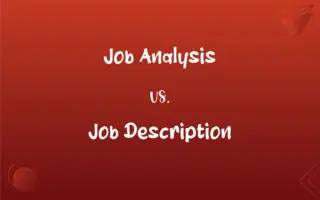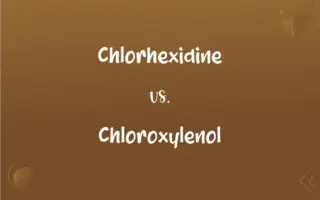Simple Future vs. Future Progressive: What's the Difference?
Edited by Harlon Moss || By Janet White || Published on December 31, 2023
Simple future expresses a single action/event in the future; future progressive emphasizes the ongoing nature of an action/event during a future time.

Key Differences
The simple future tense and future progressive tense are two aspects of English grammar used to describe actions that will occur in the future, but they differ in their focus and usage. The simple future, formed with "will" or "shall" plus the base form of a verb, is used for predictions, promises, offers, and decisions made at the moment of speaking. For example, "I will go to the store tomorrow," indicates a straightforward intention or decision. The future progressive, on the other hand, is formed with "will be" followed by the present participle (verb + -ing) and emphasizes the ongoing nature of an action in the future. For example, "I will be going to the store tomorrow," suggests an action that will be in progress at a particular time in the future.
The simple future tense is often employed when making predictions about the future, especially when the speaker feels certain about the outcomes. Sentences like "It will rain tomorrow," or "She will finish her project by Friday," use the simple future to state future events as facts. In contrast, the future progressive tense is used to indicate an action that will be happening at a specific time in the future, often when interrupted by another action. For instance, "At this time tomorrow, I will be flying to Paris," uses the future progressive to highlight the continuous action of flying at a specific future moment.
When it comes to making spontaneous decisions or immediate offers and promises, the simple future tense is the go-to choice. Expressions such as "I will help you with that," or "I think I'll have tea," illustrate decisions made at the moment of speaking. The future progressive, meanwhile, is more suited for describing planned events or actions that will be in progress over a period of time. It is often used in social arrangements or scheduled activities, as in "I will be meeting her for lunch next week," indicating a pre-planned event.
Comparison Chart
Formation
Formed with 'will' + base verb
Formed with 'will be' + present participle
Use
Decisions at speaking moment, promises
Ongoing actions in the future
ADVERTISEMENT
Focus
On the action/event itself
On the duration or continuity of the action
Example Situations
Predictions, spontaneous decisions
Actions in progress at a specific future time
Typical Sentence Structure
Subject + will + verb
Subject + will be + verb-ing
Simple Future and Future Progressive Definitions
Simple Future
Used for making future predictions without evidence.
It will probably rain later.
Future Progressive
Used for predicting future events in progress.
Tomorrow at noon, I will be meeting with the team.
ADVERTISEMENT
Simple Future
Indicates future facts or certainties.
The sun will rise tomorrow.
Future Progressive
Indicates a future action in progress over a duration.
This time next week, I will be traveling.
Simple Future
Expresses future actions decided at the moment of speaking.
I will answer the phone.
Future Progressive
Describes ongoing actions at a specific future time.
I will be studying at 8 PM tonight.
Simple Future
Shows spontaneous decisions about the future.
I will go for a walk in an hour.
Future Progressive
Shows actions that will happen in the normal course of events.
I will be attending the conference next month.
Simple Future
Expresses promises or voluntary actions.
I will send you the details by email.
Future Progressive
Expresses planned future activities or arrangements.
I will be working on the project tomorrow.
FAQs
What is the simple future tense?
It's a tense used to describe actions that will happen in the future.
How do you form a negative sentence in simple future?
Use 'will not' (won't) before the base verb.
How is the future progressive tense formed?
It's formed with 'will be' + the present participle of the verb.
What is the purpose of the future progressive?
To describe ongoing or continuous actions in the future.
When do we use simple future?
For predictions, promises, or decisions made at the moment of speaking.
Can simple future be used for assumptions?
Yes, it's often used for predictions or assumptions about the future.
Is future progressive suitable for fixed plans?
It's more suitable for actions that will be in progress at a specific time.
Are there any other ways to form the simple future?
'Going to' is also used, especially for planned actions or predictions.
Can future progressive be used for background actions?
Yes, it can set the scene for other future events.
Can we use time expressions with simple future?
Yes, like 'tomorrow,' 'next year,' etc.
Does future progressive emphasize duration?
Yes, it focuses on the duration or ongoing nature of a future action.
What about questions in simple future?
Start with 'will,' followed by the subject and base verb.
What time expressions go with future progressive?
Phrases like 'this time next week' are common.
Is simple future used for habits?
No, it's more for one-time actions or predictions.
Can future progressive indicate a temporary action?
Yes, it often suggests a temporary action happening at a future time.
Is future progressive good for emphasizing a specific time?
Absolutely, it highlights actions at a specific future moment.
Is simple future used for schedules or timetables?
It's less common; 'going to' or present continuous is often preferred.
Can simple future express willingness?
Yes, it's often used to express a willingness to do something.
How do you form questions in future progressive?
Use 'will' + subject + 'be' + present participle.
Can future progressive describe a routine?
Yes, if it's a routine happening at a specific future time.
About Author
Written by
Janet WhiteJanet White has been an esteemed writer and blogger for Difference Wiki. Holding a Master's degree in Science and Medical Journalism from the prestigious Boston University, she has consistently demonstrated her expertise and passion for her field. When she's not immersed in her work, Janet relishes her time exercising, delving into a good book, and cherishing moments with friends and family.
Edited by
Harlon MossHarlon is a seasoned quality moderator and accomplished content writer for Difference Wiki. An alumnus of the prestigious University of California, he earned his degree in Computer Science. Leveraging his academic background, Harlon brings a meticulous and informed perspective to his work, ensuring content accuracy and excellence.






































































